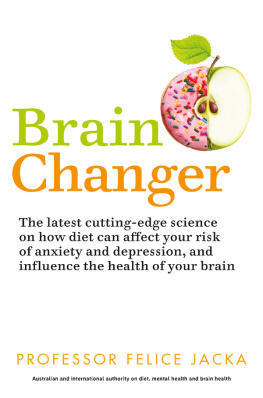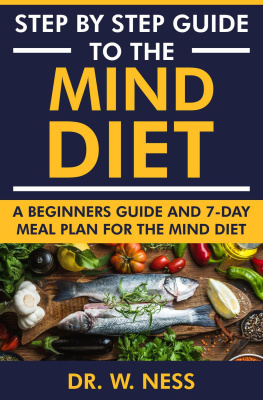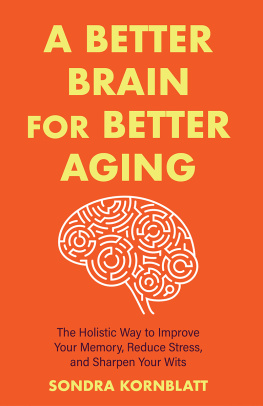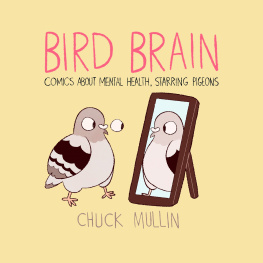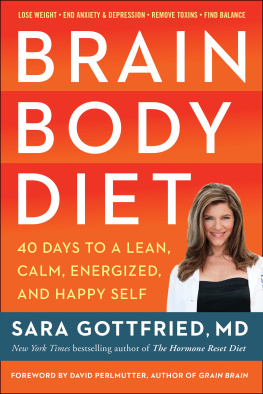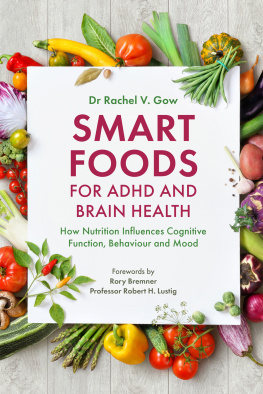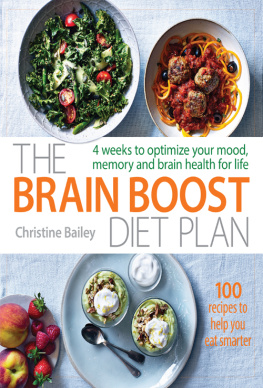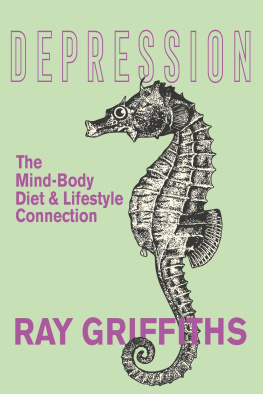Felice Jacka - Brain Changer: The Good Mental Health Diet
Here you can read online Felice Jacka - Brain Changer: The Good Mental Health Diet full text of the book (entire story) in english for free. Download pdf and epub, get meaning, cover and reviews about this ebook. year: 2019, publisher: Pan Macmillan Australia, genre: Politics. Description of the work, (preface) as well as reviews are available. Best literature library LitArk.com created for fans of good reading and offers a wide selection of genres:
Romance novel
Science fiction
Adventure
Detective
Science
History
Home and family
Prose
Art
Politics
Computer
Non-fiction
Religion
Business
Children
Humor
Choose a favorite category and find really read worthwhile books. Enjoy immersion in the world of imagination, feel the emotions of the characters or learn something new for yourself, make an fascinating discovery.
- Book:Brain Changer: The Good Mental Health Diet
- Author:
- Publisher:Pan Macmillan Australia
- Genre:
- Year:2019
- Rating:5 / 5
- Favourites:Add to favourites
- Your mark:
- 100
- 1
- 2
- 3
- 4
- 5
Brain Changer: The Good Mental Health Diet: summary, description and annotation
We offer to read an annotation, description, summary or preface (depends on what the author of the book "Brain Changer: The Good Mental Health Diet" wrote himself). If you haven't found the necessary information about the book — write in the comments, we will try to find it.
Brain Changer: The Good Mental Health Diet — read online for free the complete book (whole text) full work
Below is the text of the book, divided by pages. System saving the place of the last page read, allows you to conveniently read the book "Brain Changer: The Good Mental Health Diet" online for free, without having to search again every time where you left off. Put a bookmark, and you can go to the page where you finished reading at any time.
Font size:
Interval:
Bookmark:

About Brain Changer
You feel how you eat.
We accept that the quality of our diet affects the health of our heart and liver. So why wouldnt diet good or bad affect the health of our brain?
This is the question that Australian scientist Felice Jacka set out to answer. Having suffered depression and anxiety as a young woman, she wanted to understand the role diet plays in our overall mental and brain health. What she found through her own research and that of other eminent scientists worldwide will revolutionise the way we think about what we eat and how we care for our brains.
Obesity and depression are two major causes of disease and disability across the globe, and each influences the other.
Food does affect mood: highly processed foods increase depression risk, while a balanced, whole-food diet can prevent depression and improve mood.
A healthy diet improves gut health, and in turn health microbiota (gut bacteria) promote brain health and keep our weight in check.
A healthy diet improves brain performance at all ages, from school-age kids to their work-stressed parents.
The Mediterranean diet is linked to lower rates of Alzheimers disease and general cognitive decline in older people.
Professor Jacka, who leads the field of Nutritional Psychiatry research globally, provides not just the most recent scientific evidence but also a range of simple, practical solutions for improving the way we eat on a daily basis, including meal plans and a range of delicious recipes.
This is not a diet book. This is a guide to the good habits that will protect your most precious organ, improve your quality of life and optimise mental and brain health across your lifespan.
Jacka is leading the way in providing evidence-based approaches that are rooted in cutting-edge science to transform how we think about mental health. PROFESSOR JOHN CRYAN

For my very precious mum, Irene (Rene) Jacka,
who always dreamed of writing a book.
19202018
Ive always been interested in the impact of food on health. I grew up in an unconventional family of naturopaths, where our family dogma was very firmly rooted in the idea that what we put in our mouths formed the foundation of all our bodily processes and, ultimately, our health. That made all sorts of sense to me, although it had to be said that my dear old mum born in 1920 was no cook. To be honest, I dont know how she could have made vegetables less tasty. She would boil them until they were a sludgy heap on the bottom of the saucepan and then serve them with no sauces or flavourings. No wonder I grew up not liking vegetables!
Once I left home and started preparing food for myself, my relationship with vegetables changed and I started to appreciate their value as the foundation of every meal. Preparing a large dish of roasted sweet potatoes, tomatoes, zucchini, eggplant and all the other myriad vegetables that make up my familys daily diet, gives me a joy and satisfaction that goes beyond the direct impact of these foods on my health. In so many ways, I truly love food by which I mean real food, not manufactured food products and food has now become the focus of my lifes work.
Although I spent my twenties at art school, with no thoughts of science or research, by my thirties I had decided to go back to university to study psychology. A very important reason for this was my personal experience with anxiety and depression. After developing what I now recognise as an anxiety disorder when I was a child which is not uncommon by the time I was entering adolescence I had developed quite a severe panic disorder and started to experience regular bouts of depression. This, unfortunately, is also a very common experience for many people. From my late twenties, however, by focusing on exercise, diet and sleep, I had started to recover and stay well. This was my trigger for going back to study. As I progressed through my degree (slowly, due to two small daughters who took up a lot of my time) I began to recognise the interest I had in the brain and the biological aspects of mental health. I also started to become very interested in the idea of research rather than counselling.
By the time I was halfway through my degree I had started to do some interning work in a psychiatry research unit, headed by a wonderful psychiatrist and researcher, Professor Michael Berk. I had found my place, and I thrived in the new world of data and research that started to open up before me. As I studied and learned, I became more and more interested in mental health and the factors that influence whether or not someone will develop depression or anxiety; these are called the common mental disorders for a very good reason.
But I also became increasingly bemused as I realised how different the world of psychiatry and mental health research was from research focused on physical health. This was due to a lack of scientific data concerning the possible role of diet and nutrition in mental health, thanks to an apparent lack of interest in the topic among mental health researchers. In fact, many seemed to have a disdain for the idea that diet might be of relevance to mental health. Suggesting that what we eat might influence how we feel was to many the domain of hippie-trippy, non-evidence-based belief rather than real medicine. And that came right back around to the very good reason that there simply wasnt much in the way of scientific evidence linking food and mood. There was also a lot of misinformation, often propagated by alternative health practitioners, which had further tarnished the reputation of the topic within the research and clinical community.
Given my love of food and my firm belief that what we put in our mouths several times a day is the foundation for every aspect of our health, I decided that I wanted to change the status quo and generate quality information from rigorous science. And so I set out on a journey of research discovery. I began my PhD in 2005, examining the association between womens diets and their mental health, with a focus on the common mental disorders depression and anxiety. What I found was truly intriguing and set the scene for a whole journey of exploration that has now more than ten years later begun to change the way we think about mental and brain health.
This book tells the story of that journey and explains how and why we should consider our food as the basis of our mental and brain health throughout our lives. It also highlights practical things we can do to help prevent mental health problems in the first place, as well as strategies for treating these problems if they do arise. I hope this book provides tools that allow you and your loved ones to optimise your mental and brain health at every stage of life.
Its easy to assume that our modern diet is better than those of hundreds of years ago or even Victorian times, but that, unfortunately, is not the case.
In the United Kingdom in the mid-1800s there was a rare period of unusual good health. Despite the issues with hygiene, infectious diseases and poverty that affected people in urban areas such as London (advances in hygiene and schemes to ensure clean air and water did not start to make an impact on health outcomes until the 1870s), the life expectancy for those who made it to the age of five was as good as or better than it is now in the 21st century. Amazingly, rates of degenerative diseases, such as stroke and cancer, were only 10 per cent of what they are in the United Kingdom today. And while death from heart disease was not uncommon, it was generally as a result of contracting rheumatic fever, an infectious disease. Overweight and obesity were rare.
Font size:
Interval:
Bookmark:
Similar books «Brain Changer: The Good Mental Health Diet»
Look at similar books to Brain Changer: The Good Mental Health Diet. We have selected literature similar in name and meaning in the hope of providing readers with more options to find new, interesting, not yet read works.
Discussion, reviews of the book Brain Changer: The Good Mental Health Diet and just readers' own opinions. Leave your comments, write what you think about the work, its meaning or the main characters. Specify what exactly you liked and what you didn't like, and why you think so.

